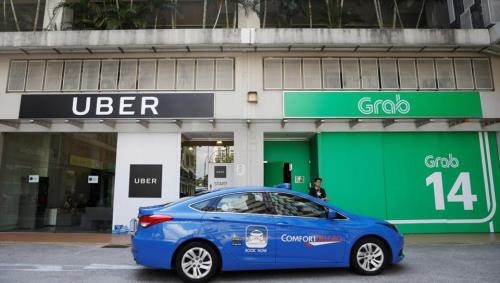Could Grab and Uber be forced to unwind their merger? Unlikely, experts say
 |
| Could Grab and Uber be forced to unwind their merger? Unlikely, experts say, Photo source : AFP |
The Competition and Consumer Commission of Singapore (CCCS) said the deal led to a "substantial lessening of competition" in ride-hailing platforms, made it harder for new competitors to enter the market, and resulted in higher prices.
It will also be seeking public feedback on proposed remedies to address competition concerns, and has recommended imposing financial penalties on the parties. It also floated the possibility that the merger could be undone unless the proposed measures do enough to address competition concerns.
However, experts Channel NewsAsia spoke to said that it was not realistic for the deal to be unwound given Uber's exit from the Singapore market and the nature of the ride-hailing business.
Dr Walter Theseira, transport economist at the Singapore University of Social Sciences, said that unwinding the merger was "practically impossible" because the ride-hailing business does not constitute only physical assets.
"It’s a practical issue. When you look at how mergers unwind in the past, it involves physical assets that can be distributed - assets go back to (company) A or B. But what about drivers and passengers? You can't identify which driver or passenger used to belong to Grab or Uber," explained Dr Theseira.
He added that even if two companies can be legally obliged to unwind the merger, it cannot be enforced.
"If I'm a Grab driver and I'm forced to go back to Uber, there's nothing that can stop me from changing back my registration to Grab. And for passengers, they'll think 'Who are you to force us to use (services from) this new competitor that we don't know anything about?'," he said.
Meanwhile CIMB economist Song Seng Wun told Channel NewsAsia that the two entities "cannot be restored" because Uber is permanently out of the picture in Singapore.
"Would a change in conditions introduced by Singapore's competition watchdog entice them back? I doubt it. Grab won the last time. What will stop Grab from beating Uber again in round two," he added.
CCCS SEEKING FEEDBACK ON PRACTICAL ISSUES OF UNWINDING MERGER
In response to queries from Channel NewsAsia, CCCS said it can "require parties to unwind" the merger "by means of a direction pursuant to section 69 of the Competition Act".
However, it stressed that it is currently seeking public feedback on whether unwinding would resolve competition concerns caused by the merger and restore competition in the Platform Market, if practical issues would arise as well as the "proportionality of any unwinding remedy".
"The public consultation will allow CCCS to obtain feedback from various stakeholders, including competitors, riders, drivers, and members of the public whether the proposed remedies can mitigate the harm on competition that arise as a result of the transaction before deciding on the final remedies," the competition watchdog said.
But Dr Theseira suggested that CCCS' suggestion to unwind the merger could be a way to ensure that Grab complies with the remedies they have mooted.
"I expect it's more of measures to ensure that Grab doesn’t integrate vertically further – like via its e-payment platforms, and other networks," he said.
Transport analyst Dr Lee Der-Horng said that CCCS' has "ignored" the fact the merger was the result of "evolution" following previous competition between the two companies.
"Since Uber had lost the drive and resources to sustain its operations in Singapore, wasn’t it a good ending for a white knight to bail Uber (the company, the drivers, the passengers) out from the mess?" said Dr Lee.
What the stars mean:
★ Poor ★ ★ Promising ★★★ Good ★★★★ Very good ★★★★★ Exceptional
Related Contents
Latest News
More News
- Vietnam sets ambitious dairy growth targets (February 24, 2026 | 18:00)
- Masan Consumer names new deputy CEO to drive foods and beverages growth (February 23, 2026 | 20:52)
- Myriad risks ahead, but ones Vietnam can confront (February 20, 2026 | 15:02)
- Vietnam making the leap into AI and semiconductors (February 20, 2026 | 09:37)
- Funding must be activated for semiconductor success (February 20, 2026 | 09:20)
- Resilience as new benchmark for smarter infrastructure (February 19, 2026 | 20:35)
- A golden time to shine within ASEAN (February 19, 2026 | 20:22)
- Vietnam’s pivotal year for advancing sustainability (February 19, 2026 | 08:44)
- Strengthening the core role of industry and trade (February 19, 2026 | 08:35)
- Future orientations for healthcare improvements (February 19, 2026 | 08:29)

 Tag:
Tag:




















 Mobile Version
Mobile Version